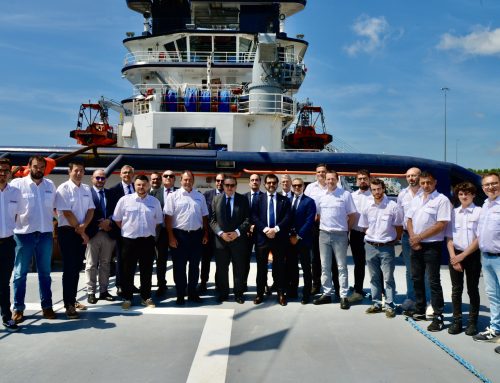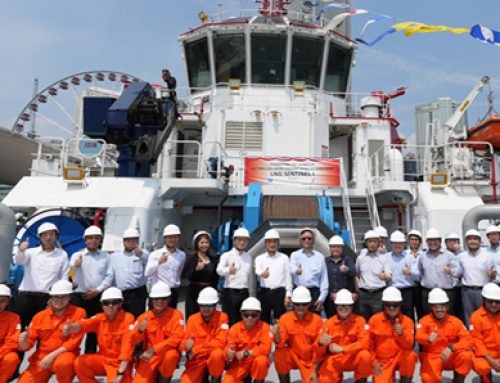The three young women aged between 22 and 27 are thrilled about their new jobs as sailors on board the vessels
“We we fit in very well as part of the crew, with a particularly warm welcome from our colleagues”
Boluda Corporación Marítima’s towing division in Spain, Boluda Towage Spain, has recently hired three young women to join its workforce at the ports of Valencia and Sagunto, becoming the first women in Spain to form part of the company’s tugboat crew. Mireia, Judith and Neus are leading the entry of women into an historically male-dominated sphere. Despite being female, they defend their right to be called “sailors” and they are very happy to feel “one of the crew” after the “warm welcome from our colleagues.”Mireia García Martínez is 27 years old and was born in Puçol, Valencia. She has worked as a sailor in the base of Sagunto since the beginning of June 2019. After finishing secondary school, she wanted to join the Valencia local police force. When no vacancies became available in that profession after studying for a year and a half, she took a degree in Occupational Risk Prevention, finally deciding to follow in the footsteps of her brother and her father to work at sea in Boluda Towage Spain’s Sagunto base.
Judith Garzón Torá is 22 years old and from Alboraia, Valencia. She has been working as a seafarer since May this year at the Valencia base, and is mother to a 16-month-old girl. She was always motivated by her father’s work in the tugboats of Boluda Towage, from Santa Pola, Alicante, at the base of Valencia, although she was also interested in the fields of sports and childcare.
Finally, Neus Domingo Ramos, aged 23, was born in Torrente, and has also worked as a sailor at the Valencia base since the end of June. On finishing school she took a degree in Geriatric Care, but after attending for a week she realised her destiny was to “work outdoors, no matter whether as a sailor or a farmer, but given that my family work in mooring, the sea drew me in as well in the end.”
Strikingly, according to statistics only 0.38% of those currently working in the maritime sector in Spain are women, a fact that Mireia García thinks “will change little by little, as women learn more about this profession, because the maritime sector has traditionally been male-oriented.”
The three women don’t put too much importance on being the torchbearers for women’s entry into a sector culturally and historically made up of men. For Judith, “it’s new alternative job opportunity for women who want to join the maritime sector. It’s just like any other job, only not as well known.”
Family inspiration
Regarding what inspired them to focus their career on the towage sector, the common denominator among the three is the desire to have a family connected to the sea and tugboats. Mireia proudly explains that her brother and father work as tug skippers in the port of Sagunto base. “It’s a sector that I’ve always known in my house.” Judith also has a father working at the base, in this case in Valencia, and Neus’s love of the sea arose from fishing trips with her father ever since she was little.
Neus studied Intermediate Vocational Training in Alicante for a year and a half to obtain a coastal skipper qualification. Mireia and Judith enrolled to study a two-year advanced degree in September to qualify as bridge officers, while Neus enrols on this degree next year.
All three maintain that their colleagues have created “an air of normality” in their work environment, nothing like the sexist stereotypes of the past. “There is a very good atmosphere and no one has made any objections,” they comment, explaining that they see a clear “cultural change” that has evolved from previous generations.
They admit that women may have ruled out working as tugboat seafarers because they thought “that it was more like a male job, that would take a lot of strength; in short, due to ignorance of the work performed in this job, which also has to do with the cultural factor”, they emphasize. “The latest technology adopted in Boluda Towage tugs is a great help, making it more comfortable to work,” adds Mireia.
For this reason, they encourage other young women like them to choose this profession. “Although you have to like it, it’s not just about trying it out and seeing what happens,” said Neus, while Judith added: “You have to like it a lot, and the job requires sacrifice, because I have a 16-month-old daughter. ”
“We tie the throw line to the tow line”
Mireia explains that the work of seafarers like herself is focused around helping the tugboat master manoeuvre large vessels that due to their weight and dimensions cannot manoeuvre in and out of the port area. “We tie the throw line to the tow line. Once they inform us from the boat that the towing line is firm, we inform the skipper and the operation begins, informing the pilot by radio that the tugboat is firmly attached. Then when the manoeuvre is over they give the “ready to go!” signal. From there we get down from the bridge, untie the vessels and the other ship sails away. It’s a very mechanical job that doesn’t require strength.”
Surprise among friends
Curiously, the three young women emphasize that “the ones who find it weirdest that we work as sailors on a tugboat are our friends”. “You’re the first person I know to work on a tug,” says Judith, quoting her friends’ comments. In contrast, Mireia emphasizes: “our co-workers didn’t put up any barriers, on the contrary, they made things easy. I felt very supported by my Sagunto colleagues right from the first day”. And Neus added: “We are just one of the team, nothing more. We don’t feel the need to prove ourselves to the guys. We just have to show that we have learned what to do”. In this vein, the three young people stress that “we feel that we are one of the crew, we have enjoyed a very positive reception from our colleagues”.
As for the timetable, they get two days off every 24 hours’ work, and in Judith’s case, with a 16-month-old daughter, she has taken being a mother in her stride thanks to the company’s work-family plan policies and the help of their parents. “For me, the only problem at first” concludes Mireia, “was wanting to do everything fast, anxious to show that you are capable for the job. But that’s already passed now.”



